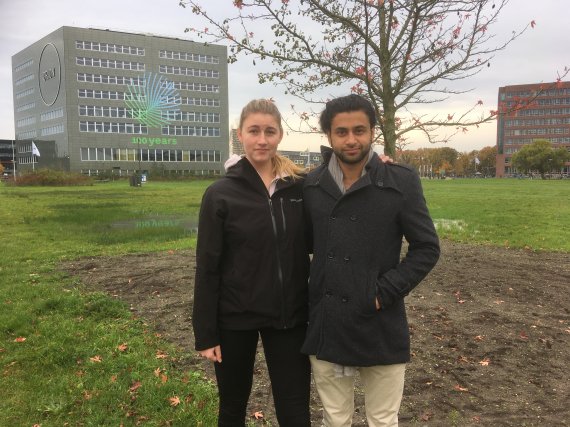Schlüter(bachelor student Environmental Sciences) and Dasoo (master student International Land and Water Management)are involved with climate action group Extinction Rebellion (XR). The group is disappointed in Wageningen University and the municipality.
What is the plan?
Dasoo: ‘The idea is simple: we stop eating food from Monday 18 November onwards. We can only consume water, tea and vitamin pills to supplement. During the hunger strike we will have regular check-ups with a doctor and dietician.’
Schlüter: ‘It will be hard, because I love my food. But I see this as an opportunity to make others aware of the seriousness of the problem.’
What are your demands?
Dasoo: ‘We demand that the university and the municipality declare a climate and ecological emergency and take a more active role in sharing the available knowledge about climate change. We demand them to become carbon neutral by 2025. Not by paying for compensation projects, but by actually becoming carbon neutral. And we demand the formation of a citizen’s assembly which can discuss the problem with experts and make binding decisions.’
Hunger striking seems quite radical.
Dasoo: ‘The climate crisis is not taken seriously enough, so the time for more radical action has come.’
Schlüter: ‘For me it is not radical. There are already people suffering from food shortages as a result of climate change. This is a way to show solidarity with them. And food shortages will only increase if we don’t act now.’
Dasoo: ‘Also, hunger strikes work. Roger Hallam (one of the founders of Extinction Rebellion, red.) went on hunger strike to demand King’s College in London to stop investing in fossil fuels. That university had invested millions of pounds in fossil fuels and none in renewable energy. Five weeks later, the university removed fourteen million pounds worth of investments from fossil fuel companies and pledged to become carbon neutral by 2025.’
Should Wageningen take Amsterdam as an example?
Dasoo: ‘Amsterdam did declare the climate crisis as the first Dutch local government. But also in Amsterdam the sense of urgency is lacking. They are turning the last organic farm the city has into a business park expansion of Schiphol airport. How much of a crisis is it then? Nonetheless, we see declaring the climate crisis as the first step. And regarding the university: it is just crazy that this institution, the world’s leading life sciences institution, is not using that status more to speak out and accelerate action.’

 Anni Schlüter and Malik Dasoo. Photo: Luuk Zegers
Anni Schlüter and Malik Dasoo. Photo: Luuk Zegers